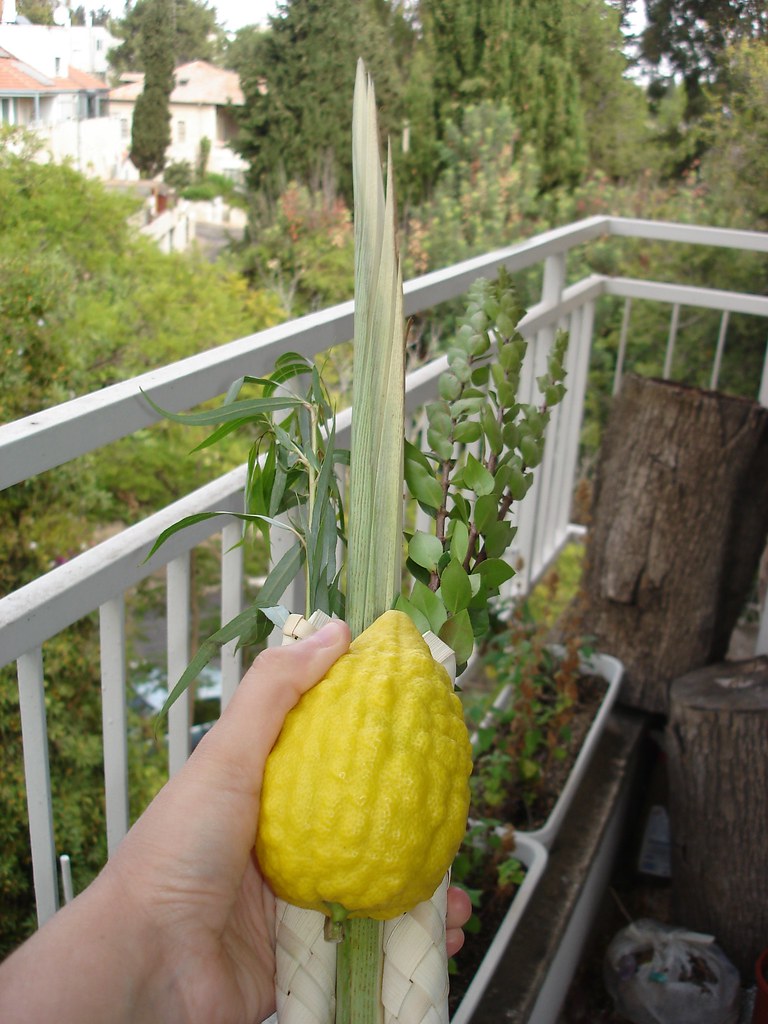| Source (German) | Translation (English) |
|---|---|
Am siebenten Tage des Laubhüttenfestes. (Hoschana Raba). |
On the seventh day of Sukkot. (Hoshana Rabbah). |
Es sei dir wohlgefällig, Ewiger, allmächtiger Gott, die Handlungen, die wir in diesem Feste verrichtet haben, wohlgefällig aufzunehmen. Mit dem frommen Wunsche, etwas dir Wohlgefälliges zu thun, beachten wir die Weise der Propheten, und haben mit der Bachweide diesen Altar umringt. Siebenmal ist dein Altar umringt worden zur Erinnerung an sieben unserer großen Vorfahren: Abraham, Isaak, Jakob, Moses, Ahron, David, Salomon. — |
[May] it be pleasing to you, Eternal almighty God, to receive with favor the actions we have performed in this festival. With the pious desire to do something pleasing to You, we observe the way of the prophets and have encircled this altar with the willow of the brook. Seven times your altar has been encircled in memory of seven of our great ancestors: Avraham, Yitsḥaq, Yaaqov, Mosheh, Aharon, David, Shlomo. — |
Herr, was sind wir, was ist unser Leben, was ist unsere Kraft und unsere Tugend. Wir beugen uns demüthig vor Gott, von dessen Gnade wir alles erwarten. Wir selbst haben so wenig Verdienst wie diese Bachweide, die weder Geschmack noch Geruch hat. Wir schlagen sie hier an die Erde zum Zeichen unserer Unterwerfung vor Gott. Durch Demuth wollen wir die Sünden büßen, die wir mit den Lippen gethan haben, von denen diese Bachweidenblätter ein Bild sind. Damit wir den Fluch von uns abwenden, den David ausgesprochen hat: „Rotte aus, Ewiger, alle heuchlerische, glatte Lippen.” (Psalm 12, 3) Und wenn wir alles, was unsere Pflicht gebietet, nur unvollkommen ausüben, aus Mangel an Einsicht, so schließen wir uns in Gedanken an diejenigen an, die den tiefen Sinn dieser Ceremonien ganz erfaßt haben, und beten: Die Lieblichkeit des Ewigen, unseres Gottes sei uns beschieden, so gelingt das, was wir thun; denn all’ unser Thun gelingt nur durch ihn. Amen. |
Lord, what are we, what is our life, what is our strength and our virtue? We humbly bow before God, from whose grace we expect everything. We ourselves have as little merit as this brook willow, which has neither taste nor smell. We strike it here on the earth as a sign of our submission to God. Through humility we want to atone for the sins we have committed with our lips, of which these brook willow leaves are a picture. So that we may turn away from ourselves the curse pronounced by David: “Root out, O Eternal One, all hypocritical, smooth lips.” (Cf. Psalm 12:3-4) And if we perform imperfectly, for lack of discernment, all that our duty enjoins, let us join in thought those who have fully grasped the deep meaning of these ceremonies, and pray: May the lovingkindness of the Eternal, our God, be granted to us, so that what we do succeeds; for all our doing succeeds only through Him. Amen. |
“Am siebenten Tage des Laubhüttenfestes. (Hoschana Raba)” was translated/adapted by Yehoshua Heshil Miro and published in his anthology of teḥinot, בית יעקב (Beit Yaaqov) Allgemeines Gebetbuch für gebildete Frauen mosaicher Religion. It first appears in the 1829 edition, תחנות Teḥinot ein Gebetbuch für gebildete Frauenzimmer mosaicher Religion as teḥinah №50 on pp. 72-73. In the 1835 edition, it appears (misnumbered) as teḥinah №51 pp. 90-91. In the 1842 edition, it appears as teḥinah №54 on pp. 95-96.
We welcome corrections and improvements. The transcription of the German from Latin script in Fraktur type provided machine-readable text for a machine translation by DeepL, which we then edited for accuracy and clarity. –Aharon Varady
Source(s)



“Am siebenten Tage des Laubhüttenfestes (Hoschana Raba) | On the seventh day of Sukkot (Hoshana Rabbah), a teḥinah by Yehoshua Heshil Miro (1829)” is shared through the Open Siddur Project with a Creative Commons Attribution-ShareAlike 4.0 International copyleft license.



![Für den ersten Tag des Laubhüttenfestes [no.2] (Yehoshua Heshil Miro 1829) - cropped](https://opensiddur.org/wp-content/uploads/2022/03/Fur-den-ersten-Tag-des-Laubhuttenfestes-no.2-Yehoshua-Heshil-Miro-1829-cropped.png)


![[Gebet] An den ersten Tagen des Laubhüttenfestes | [A prayer] on the first days of Sukkot by Fanny Neuda (1855)](https://opensiddur.org/wp-content/uploads/2012/09/stunden-der-andacht-page_082.png)
![[Gebet] An den letzten Tagen des Laubhüttenfestes | [A prayer] on the last days of Sukkot, by Fanny Neuda (1855)](https://opensiddur.org/wp-content/uploads/2017/10/stunden-der-andacht-page_095.png)


Leave a Reply